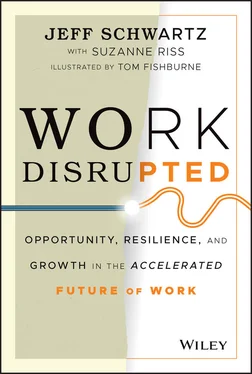Why ATMs Did Not Replace Bank Tellers
The surprising story of automated teller machines (ATMs) and bank tellers offers a fascinating illustration of how new technology, if properly harnessed, can change individual jobs—or the tasks that make up the job—without eliminating the worker. The transformation of bank tellers provides a useful counterpoint to arguments by automation alarmists. When ATMs were first introduced in the 1970s, many predicted that bank tellers would lose their jobs. After all, ATMs took over their basic job functions, making it possible to deposit a check or withdraw cash from a machine. 43 This new “automatic” teller seemed to be able to do everything the human teller did. So what happened to bank tellers? Since ATMs appeared on the scene, the number of human bank tellers in the United States has roughly doubled, according to Boston University economist James Bessen. He has noted that the adoption of ATMs did not, in fact, reduce the number of teller jobs—it changed their jobs. 44 Indeed, their jobs evolved. New skills were needed. Bank tellers took on different roles, learning to assist customers with loans, open new accounts, market financial products, troubleshoot, and more—jobs that machines were unable to do.
Bessen reports that between the mid-1990s, when about 400,000 ATMs were introduced, and the year 2000, the number of teller jobs grew faster than the labor force as a whole. And while that may eventually change, the near-term impact of ATM technology actually created more jobs. 45 The ATM created more full-time teller jobs at banks because it allowed banks to open more branches, since each branch could operate with fewer tellers, which also meant banks could hire more tellers overall. It should be noted that the jobs of bank tellers are not forever secure, however, due to continued industry consolidation and technological changes. And let's not forget about mobile banking, which also involves automation of work previously handled by humans. However, it is interesting to note that the evolution of bank tellers' jobs is similar to what happened in the nineteenth century with the textile industry. Though most of the work suddenly was automated, the number of weavers continued to grow for decades. 46 More automation meant the price of cotton cloth fell, and people used more of it.
Projections that the future of work will usher in mass unemployment rest upon several flawed assumptions. The first is that a job consists of a single task. Most jobs consist of many tasks, not all of which can be automated. The second is that technology is a substitute rather than a complement to human labor. In most cases to date, technology augments but does not wholly eliminate human workers. What we tend to forget is that technological innovation could create jobs that we have not yet imagined. Changes in how we work have been underway for decades, as the activities in most occupations have shifted from basic and repetitive tasks to more advanced tasks. This means we spend less time collecting data and more time solving problems.
Elevator operators have the distinction of being one of the very few occupations in the past 60 years that has been eliminated from the Census Bureau logs due to automation. 47 Add to this list the switchboard operator and the bowling alley pinsetter. Meanwhile, new job titles like app developer, social media director, and data scientist have emerged. A rule of thumb today is that if your job is repetitive, routine, and predictable, and you can easily describe it, chances are large portions of it can be automated. If someone can write a script that describes the job, or create a set of algorithms or rules, then a machine will be able follow those rules and do the work.
Our cultural idea of work has undergone dramatic shifts before. In the preindustrial economy, work was synonymous with craftsmanship, with someone creating a product from start to finish. For example, a cobbler would do everything from measure the customer's feet to make any adjustments in the finished pair of shoes. The Industrial Revolution changed this conception of work, as it became clear that products could be manufactured more quickly and cheaply if work was divided into smaller, repeatable tasks in which workers could specialize. For many, the notion of a “job” became a collection of distinct tasks. Today, we appear to be redefining work again, with the shift moving in the opposite direction: As computers can complete more tasks, people may increasingly move from completing tasks to the more human capabilities, such as problem-solving, communicating, interpreting, addressing unexpected challenges, asking questions, and managing human (and human and machine) relationships.
There's a lot of debate over whether things will be different this time around in the so-called Fourth Industrial Revolution. In the past, industrial revolutions centering on mechanization, electrification, and computerization dramatically reshaped jobs, especially for low-skill workers in agriculture and manufacturing. A key difference today is that advances in digital technologies are poised to have an impact on every sector of the economy. Another difference is that we are building machines that can do more than mechanize routine tasks that people already do. Machine learning means machines are able to move beyond the script of an algorithm to actually learn to do something on their own by discovering patterns. Machines can therefore propose new solutions to problems. This type of autonomy is what makes people feel uneasy.
Employees Are More Adaptable Than We Think
A 2019 global survey by Harvard Business School researchers looked at whether employees would be willing to do whatever it takes to survive the twists and turns of a rapidly evolving economy. The survey found that employees are more adaptable than they are often given credit for. The survey focused on business leaders as well as the people most vulnerable to changing dynamics: lower-income and middle-skills workers. The majority of the workers had no more than two years of postsecondary education. 48
Not surprisingly, business leaders surveyed were worried about finding employees with the skills their companies needed when operating in a climate of perpetual disruption. The workers surveyed, however, focused more on the opportunities and benefits that the future holds for them. They were much more eager to embrace change and learn new skills than their employers expected. According to the survey, a majority of the workers felt that advances such as automation and artificial intelligence would have a positive impact on their future. What concerned them most was that other workers—temporary, freelance, outsourced—would take their jobs. When asked why they had a positive outlook, workers cited two reasons: the prospect of better wages and the prospect of more interesting and meaningful jobs. 49 Both automation and technology, they felt, offered opportunity on those fronts—by contributing to the emergence of more-flexible and self-directed forms of work, by creating alternative ways to earn income, and by making it possible to avoid tasks that were “dirty, dangerous, or dull.”
We can learn a lot from past technological transitions. In the absence of dynamic and responsive policies, as well as resources to manage the transitions, displaced workers often faced more uncertainty and pain than was necessary. We can all play a role in shaping the future of work. If AI, robotics, and new employment models do indeed transform most jobs, requiring new skill sets for workers, our challenge is to create paths forward and opportunities that everyone can access. At stake is not only economic survival but psychological well-being as well.
Читать дальше












